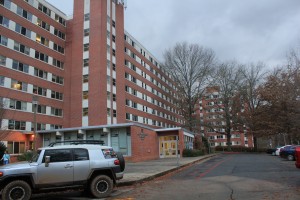
Chalking at the Catafount. Photo by Patrick Clemons
Originally published in The Sylva Herald on Feb. 27, 2020.
The words chalked around the fountain in the center of the Western Carolina University campus expressed the frustration of many students: “More than 9,000 students on campus, less than 5,000 beds on campus. Do you hear us? You might want to start looking for an apartment.”
Students looking for on-campus housing had a challenging week of registering for dorm space for the 2020-21 academic year.
On Monday, Feb. 10, at 7:30 a.m., Residential Living began the housing process. This year, WCU decided to accept room agreement forms electronically rather than at the Residential Living office as in previous years. There were reports from students of numerous error codes, timeout messages and slow response times.
WCU’s I.T. Help Desk sent out an email to students at 8 a.m., reporting “students are unable to complete room assignments and preferences” and that there was no workaround to these issues. At 1:52 p.m. the same day, another email was sent saying the service had been restored. Unfortunately for students, the wait list process began “a few minutes before 2 p.m.,” according to WCU spokesman Bill Studenc, which resulted in 443 students on the wait list as of Wednesday, Feb. 19.
The transition to online housing agreements and the pending demolition of Scott and Walker residence halls has complicated housing issues in Cullowhee.

The Scott and Walker dorms are going offline for Fall 2020. Photo by Jake Myers.
For fall 2019, WCU’s Office of Residential Living had approximately 4,560 on-campus beds available. For fall 2020, approximately 4,047 beds are expected to be available. In addition, a new student housing complex that will not be managed by Residential Living is currently under construction on the West Campus through a public-private partnership. And private developers are building several new apartment complexes that are scheduled to open this fall, adding several hundred additional beds to the off-campus housing inventory.
In the fall of 2020, WCU expects a range of 2,075 to 2,125 new first-year students and 1,111 transfer students.
Forty percent of new transfer students are distance learning students.
“On-campus housing is typically 95 percent or more full,” Studenc said. “Accordingly, an estimated 35 to 37 percent of the fall semester census headcount lived on-campus over the last couple of years.”
WCU Policy 96 states, “All newly admitted, degree-seeking undergraduates who have not attended college following high school completion (excluding enrollment in the summer immediately following high school graduation) are subject to a two academic year (four fall or spring semesters) requirement to live in the residence halls,” which, combined with swelling enrollment thanks in part to the low-tuition NC Promise initiative, may be contributing to the housing crunch at WCU.
The Department of Residential Living can choose to communicate, per policy guidelines, that the second-year requirement will not be in effect for the following year for that particular first year/transfer class.
As of Friday, Feb. 21, the policy had not been waived.
Many apartment complexes in the area started leases for the fall of 2020 in the fall of 2019.
Riley Johnson and his roommate, rising seniors, didn’t go through the Residential Living process but still had trouble finding a place to live.
“I emailed the Suites Villas as well as Rabbit Ridge, and they said all apartments were sold up,” Johnson said.
Johnson and his roommate were able to find an apartment at The Summit.
WCU is reminding students that financial aid can be used to assist with paying for off-campus housing. For information on off-campus housing, visit offcampushousing.wcu.edu.



